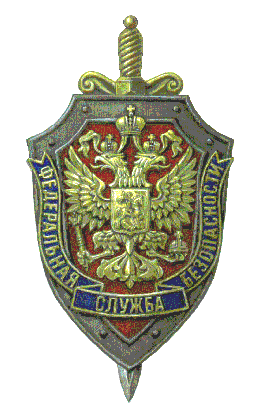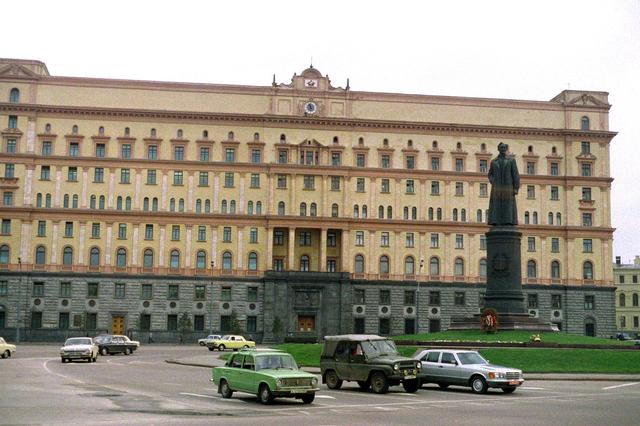Spy vs Spy: is East-West Espionage on the Rise?
June, 2008
There are new fears that espionage between East and West is on the increase, despite the end of the Cold War. Former foes continue to accuse one another of spying, with Britain's intelligence service, MI5, recently announcing it needs extra resources to keep an eye on the operations of Russia and China. The James Bond film “From Russia with love” hit the screens in the 1960s, and it seems that the idea that the Soviet Union - and subsequently Russia - was a heady mix of beautiful women and espionage has never faded. Almost half a century later, the country that produced the world’s most famous fictional spy, agent 007 - seems to be all too keen on looking for signs of espionage everywhere - and Russia remains a favorite target.
MI5 recently announced it needed extra resources to keep an eye on Moscow’s operations. Jonathan Evans, the intelligence service’s Director-General, said: “Despite the Cold War ending nearly two decades ago, my service is still expending resources to defend the UK against unreconstructed attempts by Russia, China and others, to spy on us.” However some experts say the murky world of espionage is hard to assess. Professor Anthony Glees, Director of the Brunel Centre for Intelligence and Security Studies at Brunel University, said: “The question of Russian hostile intelligence work against the UK comes into the category of things we know we don’t know. So we know there is a problem, we don’t know exactly how big it is.” With Russia restored to the world stage, Britain seems intent on bringing back old stereotypes, and suggests the world follows suit.
A recent article in the Economist calls on the European Union to introduce a healthy dose of paranoia when it comes to protecting its classified information. “Who else other than Russia?” it asks, while discussing its “increasingly energetic espionage efforts”. But as British Labour MP Derek Wyatt said: “It’s a comment, there are no actual facts attached to that. I can’t really believe it, to be honest. Everyone now takes protection. Everyone is more sensitive now about back up and protection. They may not scream or shout about it but they probably wouldn’t want you to know, would they?” So how real is the threat from Russia and its computer geniuses, believed to be hacking into the world’s most protected secrets? The answer is at best unclear.
”When we start asking ourselves what countries are involved - there are great deal of references in the press of who is responsible. Only when you start to investigate and drill down and instead of the picture becoming clearer, it becomes murkier,” said Professor Peter Sommer, computer crime and industrial espionage expert at the London School of Economics. The professor is convinced that in the world of modern communications, especially in cyber space, it’s almost impossible to track anyone down. It seems many experts agree: there's nothing new in countries spying on each other. It’s just a question of who points the finger first. A former officer with the Russian intelligence service, Mikhail Lyubimov, says that there’re likely to be more stories on Russian espionage in the future.
“There are two ways of making a spy scandal. One is a classic, an honest way, when you arrest a spy, some foreign agent, make a trial. It is completely legal, the press is informed. And the spy gets, say, 30 or 40 years. And there is another, not a classic, but I would say very modern way, you just expel people Soviet or Russian, and this is all. You say that he is connected with foreign intelligence. Another way which is used by intelligent services many times a year is of course articles like the one we were discussing now. It sounds very scandalous, but simply it is completely with no proof,” he said.
Source: http://www.russiatoday.ru/news/news/26431
Russia Says 300 Spies Caught In Last 4 Years

The head of Russia's Federal Security Service told a popular weekly that the FSB had identified over 300 foreign spies over the past four years. "More than 270 actively operating agents and 70 foreign intelligence recruits, including 35 Russians, have been exposed since 2003," Argumenty i Fakty quoted Nikolai Patrushev as saying. He said that 14 agents and 33 recruits have been caught this year alone. Patrushev said six Russians were caught in an attempt to transfer state secrets to foreign countries, and have been sentenced to lengthy prison terms. Retired Colonel Valentin Shabaxturov was given a 12-year sentence this year for treason and espionage. The court proved he had actively cooperated with foreign intelligence for seven years, from 1999 to 2006, and revealed state secrets to them. Igor Arsentyev, a lieutenant colonel in the reserves, was sentenced to nine years in prison on the same charges in September. Patrushev said another person is facing court proceedings, and that an investigation is underway into three other cases. He said the United States and Britain actively used the secret services of Poland, Georgia and Baltic states against Russia. "This concerns a wide spectrum - from staff composition and budget allocations to strategic guidance and organization of joint operations," Patrushev said. He also said some Georgian secret agents use their connections with the criminal underworld for their operations, and to stage various acts of provocation. According to Patrushev, British intelligence is particularly active against Russia, in its attempts to influence the country's domestic political developments.
Source: http://mnweekly.ru/national/20071011/55281841.html
Russian, Chinese Spies Saturate U.S., Britain

The legendary MI5 British counterintelligence service is said to be deeply concerned over an increase in spying by Russian and Chinese operatives in the United Kingdom. The United States' Federal Bureau of Investigation has similar concerns with Russian and Chinese agents infiltrating the U.S. military-industrial complex, sometimes in violation of American immigration laws. Although intelligence experts aren't certain how widespread the problem is, they believe the espionage is rampant and a serious consequence of the global economy. MI5 suspects upwards of 15 foreign intelligence services are working within the UK and are a threat to the United Kingdom's interests, and the primary focus of their counterespionage efforts are the Chinese and Russians. Using many of the same methods the Japanese used in the United States in the 1960s and 1970s, the Chinese are interested in any and all information that may give them a leg up in the competitive global economy. In spite of repeated warnings to businesses, companies in the UK and U.S. continue to hire Chinese workers without conducting thorough background investigations including verifying previous employment or immigration status.
Chinese government officials and businessmen are proven aggressive in their attempts to find out everything about how Western companies operate and how they are structured. It is old-fashioned human intelligence gathering -- it's thousands of years old and it works. Taking a page out of Sun Tzu's "The Art of War," they believe intelligence operations will give them the victory they seek, whether in terms of military prowess or industrial success. Using stealth tactics such as sending visiting delegations of Chinese businessmen, the spies are able to penetrate what little security companies employ to thwart theft of information. One British firm eager to develop its business with China recently invited a delegation to visit its UK factory, according to The Guardian. The Chinese authorities sent a delegation, but only a few of them turned up. The rest were believed to have traveled around Britain inviting themselves to defense and research establishments. Again, they were able to penetrate the security measures in place at these facilities.
According to several business leaders in the UK, if a British company creates a fuss about visitors who fail to turn up, the Chinese threaten to cancel the company's license to trade. As with the Japanese spies in the U.S., the Chinese spies are specifically interested in scientific and high-tech developments. Their economy is said to be booming while at the same time there is a serious shortage in information technology and modern processing, manufacturing and design skills. MI5 is also concerned over the loyalties of Chinese who are UK citizens. Intelligence officers claim these workers may have mixed loyalties and strong ties to China. In Britain, the Chinese and Russians appear to focus on high-tech production, such as security and surveillance systems, conventional weapons systems, and especially dual use equipment -- materials that can be used by the private sector or by the military.
The Federal Bureau of Investigation is also alarmed about the impact of foreign spies within the United States, especially Chinese and Russian operatives. As with businesses in the United Kingdom, American companies seem to pay little attention to corporate espionage, putting most of their security budget into protection against terrorist attacks. The FBI are suspicious of Russia, Iran, and North Korea but have focused mostly on the Chinese. The feds estimate that the are over 2,600 Chinese front companies in the U.S. U.S. and UK security experts believe that when nations such as China and Russia saw the speed and effectiveness with which the U.S. conducted the Iraq invasion, they decided widespread espionage operations were necessary to keep up with the world's sole superpower.
Source: http://www.renewamerica.us/columns/kouri/060412

No comments:
Post a Comment
Dear reader,
New blog commentaries will henceforth be posted on an irregular basis. The comment board however will continue to be moderated on a regular basis. You are therefore welcome to post your comments and ideas.
I have come to see the Russian nation as the last front on earth against the scourges of Westernization, Americanization, Globalism, Zionism, Islamic extremism and pan-Turkism. I have also come to see Russia as the last hope humanity has for the preservation of classical western/European civilization, ethnic cultures, Apostolic Christianity and the concept of traditional nation-state. Needless to say, an alliance with Russia is Armenia's only hope for survival in a dangerous place like the south Caucasus. These sobering realizations compelled me to create this blog in 2010. This blog quickly became one of the very few voices in the vastness of Cyberia that dared to preach about the dangers of Globalism and the Anglo-American-Jewish alliance, and the only voice emphasizing the crucial importance of Armenia's close ties to the Russian nation. Today, no man and no political party is capable of driving a wedge between Armenia and Russia. Anglo-American-Jewish and Turkish agenda in Armenia will not succeed. I feel satisfied knowing that at least on a subatomic level I have had a hand in this outcome.
To limit clutter in the comments section, I kindly ask all participants of this blog to please keep comments coherent and strictly relevant to the featured topic of discussion. Moreover, please realize that when there are several "anonymous" visitors posting comments simultaneously, it becomes very confusing (not to mention annoying) trying to figure out who is who and who said what. Therefore, if you are here to engage in conversation, make an observation, express an idea or simply insult me, I ask you to at least use a moniker to identify yourself. Moreover, please appreciate the fact that I have put an enormous amount of information into this blog. In my opinion, most of my blog commentaries and articles, some going back ten-plus years, are in varying degrees relevant to this day and will remain so for a long time to come. Commentaries and articles found in this blog can therefore be revisited by longtime readers and new comers alike. I therefore ask the reader to treat this blog as a historical record and a depository of important information relating to Eurasian geopolitics, Russian-Armenian relations and humanity's historic fight against the evils of Globalism and Westernization.
Thank you as always for reading.